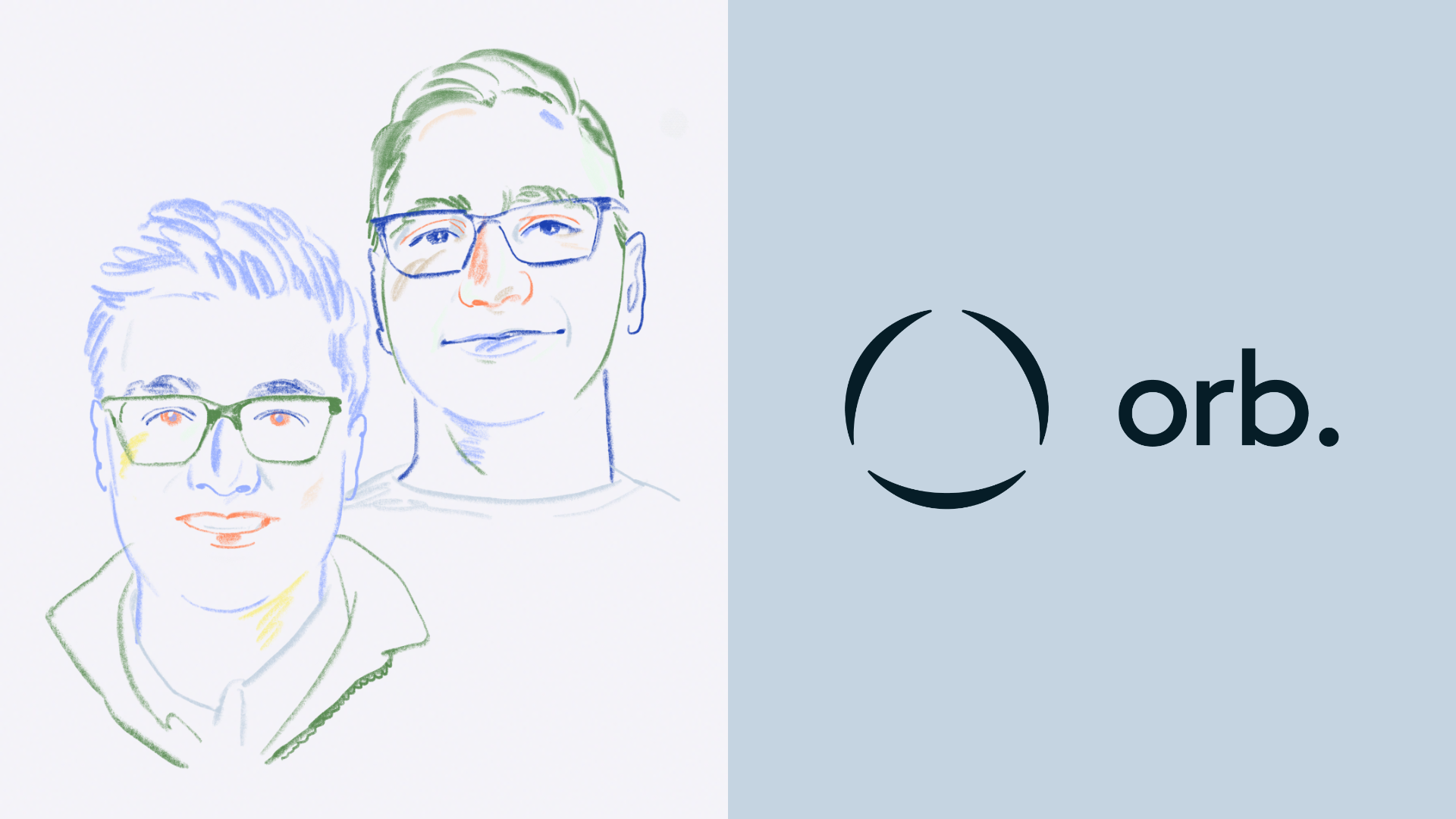Conviction And Certainty Are Not The Same: A Case Study of Orb
How one of the first teams to graduate from the SPC Founder Fellowship learned to pursue conviction instead of certainty.

In startups, as in life, we crave certainty. Anyone facing a major life decision can understand why. Our time is finite and we want to spend it well. But there are some things, often the most important, that we can never know for sure. Will this relationship make me happy? Should I pursue a new career path? Will this idea make a successful company?
Striving for certainty is a trap because we crave it most when it’s least attainable. But we can build conviction. Conviction is possible even with the hardest or most important choices, like getting married, or changing careers — or launching a company that changes how a $2 trillion industry does something as fundamental as billing.
That’s what co-founders Alvaro Morales and Kshitij Grover are aiming for with Orb, one of the first companies to graduate from the SPC Founder Fellowship. The team shared how they built conviction that there’s a huge opportunity to change how software companies interact with customers: switching to usage-based billing. And while a growing list of customers, a rapidly expanding team, and a seed round backed by top-tier VC and angel investors makes their conviction look easy now, Alvaro & Kshitij were frank about how different things were when they founded the company a year ago.
Usage-based billing is just the latest inflection point in how software companies transact with customers. But those inflection points are a big deal:

Transitioning from licenses to subscriptions and per-seat billing unlocked an entire generation of SaaS products. Changing how companies charge for their products can create entirely new industries.
Pay for use isn’t a new concept. It’s how we all pay for our utilities. Powerhouse companies (pun intended) like Snowflake, Twilio, and Datadog already bill by usage and see model-breaking retention rates. The new opportunity comes from how much of the internet is now built on cloud services and productized building blocks. More and more companies are packaging what it takes to build a modern software business as APIs, infrastructure services, and SaaS applications, in turn producing more opportunities for billing innovation.
That’s the big change on the horizon. Here’s how Orb positioned itself to lead it.
If you were making a bet on who would figure out usage-based billing, it would have to be on a founder team like Alvaro and Kshitij. They’re both developers and builders at heart. Both held leadership positions at Asana, working on core infrastructure. Those roles gave them the experience of vetting and buying different software solutions, regularly exposing the frustration of limited billing options. Over several years, the pair built enough trust to quit their jobs and start a company together.
But deciding to start a company is not the same thing as actually launching a company. Alvaro and Kshitij found themselves in what we like to call the -1 to 0 phase — when your task is to tame the chaos of possible options into the clarity and conviction of a singular purpose. When the Orb founders decided to navigate that phase in the inaugural cohort of the SPC Founder Fellowship, we jumped at the chance to bet on them.
Kshitij: The hardest thing in [the -1 to 0] stage was not being able to measure progress. At school or at Asana, there was always some bar that I could say ‘ok, am I hitting that bar?’
That bar? That’s certainty. And when you’re starting a company, you’re going to want it and you’re not going to get it. No one will give you an A or define clear KPIs for testing your ideas. Put another way—
Kshitij: If you’re chasing after the capital-T truth, you’re going to have a hard time moving on from anything, because you’re not going to have certainty that a premise was wrong.
This is where the distinction between certainty and conviction comes in. Conviction is an internal state that we build, while certainty is the external removal of doubt.
That doesn’t mean reaching conviction is easy. Quite the opposite.
Alvaro: Convincing yourself is the hardest hurdle to clear. How do you gain internal conviction that the conditions for starting a venture around an opportunity are the right ones?
The central premise of the SPC Founder Fellowship, and of SPC generally, is that it’s easier to build conviction in a community of people doing the same. “But wait,” you might say, “if conviction is internal, why do I need community?” For the same reason that anything that’s hard to do is easier with the support of people who understand it. For the same reason that companies are generally easier to build with a co-founder than alone. Building conviction communally lets you validate internal processes externally, without that validation process backsliding into the self-defeating search for certainty.
Kshitij: Early in the fellowship we realized that our first idea wasn’t going to be a productive initial entry point. We were feeling pretty down about it. And our SPC fund partners said, ‘Great. We're going to be having this conversation for the next six months, guys. This is par for the course.’ We got the same calibration from other founder fellows too.
That’s what’s unique about SPC and the Founder Fellowship. We reject certainty, embrace doubt, and maintain a culture and structure designed to help you build conviction. Surrounding yourself with other people and teams going through the same struggle dramatically accelerates your learning progress.
After an enormous amount of hard and often frustrating work, the Orb team had conviction. Alvaro and Kshitij remained focused during the fellowship on that fundamental exchange between company and customer: billing. The subscription and per-seat models that dominated the last decade for API and digital infrastructure companies looked ripe for disruption. Many companies that stood to benefit from a usage-based model found the costs to build it in-house prohibitive. This is exactly the kind of problem that brought Alvaro and Kshitij together in the first place. It spans across the companies that make the internet what it is. It’s a big deal. Or, as Alvaro put it:
Alvaro: Every single software company that makes up the infrastructure of our digital world needs to succeed with billing.
But how, exactly? Usage-based billing has a lot of inherent variability from company to company — the way a cloud database bills for usage is different from the way a fintech API or video streaming service bills for usage. Pricing has become a competitive differentiation for companies, so the rate of innovation is high. Alvaro and Kshitij learned this through the tried-and-true conviction-building method of customer interviews, many of them introduced through the SPC alumni network. They also knew from their time at Asana that integrating with a billing vendor often requires having to build custom systems to work around limitations.
These observations revealed an angle on the problem: building a usage-based billing system can’t just be a one-size fits all solution. Incumbents and competitors try to cut out the developer and deploy a few rigid pricing models out of the box. But decisions about which billing system to pick often shift from finance to engineering, creating an unserved customer constituency. The Orb team differentiated by empowering engineering teams with the right level of extensibility to support unique business models.
And then they got the best confidence-booster of all: success with actual customers. Few things help build conviction faster than early traction. It confirmed that the Orb co-founders’ core competency as engineers and insight into the diversity of pricing needs across companies let them offer the best developer experience and build the best developer product.

Conviction requires three things that Orb now has:
- Enthusiasm about what you’re committing to
- Clarity in your course of action
- Confidence that you’re ready to make a bet (and accept the outcome)
The Orb founders entered the Founder Fellowship intent on fixing pricing and billing for internet companies. They verified their core problem statement with the SPC network of companies, confirming their excitement. Their experience and experimentation revealed a killer angle: help companies implement usage-based billing, but focus on extensibility and working with developers. The building blocks of the internet are increasingly specialized, their billing needs increasingly bespoke — so Orb is bespoke, too. Clarity: check.
Confidence is the hardest part. It’s where you lay down what you’re betting (your time, money, sanity) against the excitement and clarity. And once the bet finally seems worth it, you have conviction. Community makes it a lot easier to find the confidence to finally make a bet. So do customers.
This process is fundamental to the SPC Founder Fellowship. We expect founders to build conviction before they raise a round — not during, and certainly not after, which are both real dangers in a founder-friendly fundraising environment. Get to conviction first, and lean on others doing the same — that’s the SPC ethos in a nutshell.
Orb is the thriving product of two founders’ conviction. Alvaro and Kshitij are betting years of their lives that they can change how a $2 trillion industry runs a can’t-fail part of business. Nothing is certain. But they’re convinced it’ll work.
